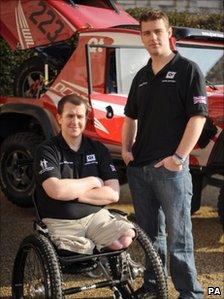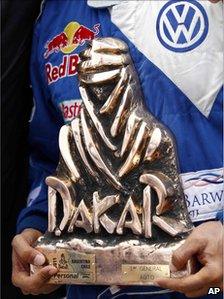Dakar Rally: Wounded soldiers' challenge
- Published
Dakar is one of the toughest rallies in the world
You would have thought that sand, dust and specialist off-road vehicles would all have painful memories for Captain Anthony Harris.
In 2009 he was injured in an explosion while travelling in a Jackal armoured vehicle in the treacherous Sangin district of Afghanistan and ended up losing the lower part of his left leg.
But after being fitted with a new prosthetic limb, he is now ready to get behind the wheel of another all-terrain vehicle - this time to race through the deserts and dunes of South America in the toughest off-road race of all, the Dakar Rally.

Anthony Harris (r) - with Gavin Harvey - hopes to regain his competitive edge
In 2013 he will be part of the first team of disabled people to take part in the gruelling, 6,000-mile endurance race.
The rally used to take place between Paris and Dakar but has now been transferred to South America for security reasons.
However, it remains one of the greatest motoring challenges in the world.
Only about 40% of the teams taking part complete the race, which covers vast stretches of wilderness between Chile and Argentina.
Capt Harris, who serves in the Royal Regiment of Fusiliers, is relishing the challenge.
He says the Dakar Rally will give him the chance to get back that competitive edge, along with the rush of adrenaline and a sense of achievement.
"The one thing I felt really strongly about is that I didn't want the last exciting thing I ever did in my life to be that day I got blown up in Sangin," he says.
Capt Harris is not alone. His co-driver will be Corporal Tom Neathway, of 2nd Battalion, the Parachute Regiment.
Cpl Neathway is a triple amputee who lost both his legs and an arm while on patrol in Helmand, in southern Afghanistan.
Adventure and skills
A skilled army sniper, he triggered an improvised explosive device (IED) when he moved a sandbag in an Afghan compound to take up a firing position.
But he has not let his disability stop his taste for adventure. He has already been skiing and recently bought himself a Porsche with some of the money he received in compensation.

Many participants emerge injured from the gruelling race
Other members of the team include Sergeant Gavin Harvey, who also lost both his legs to an IED.
As a serving member of the Royal Electrical and Mechanical Engineers, his skills as a mechanic will be vital to maintain the specialist 4x4 vehicle as it speeds through the rally's dunes and deserts.
It is hoped that the Project Mobility team will also get the support of Paratrooper Ben Parkinson, who lost both his legs and was left in a coma when his vehicle hit a roadside bomb in Afghanistan in 2007.
The team say the skills he can offer are "relentless determination, stamina and being stubborn" - qualities learnt from fighting back against the odds. He's still recovering from brain and spinal injuries.
Project Mobility hopes to raise half a million pounds, some of which will pay for the two specially adapted off-road vehicles.
Adapted vehicles
The QT Wildcat cars they will be driving in the 2013 Dakar Rally each cost £120,000. They will have a hydraulic chassis that can lift the car off the ground should it become stuck in the sand.
The cars can also carry 380 litres of fuel, essential for the 500 miles they'll have to cover in a single stage, as well as spare tyres and water.
Meanwhile, the support team will also have to worry about the dirt and dust that could get into the soldiers' prosthetic limbs.
Alec Savery, the support team director, says the back-up team will have its work cut out.
He says that people come back injured from the rally even when they are able-bodied, so "these guys are going to take a hammering".
But their determination to take on the toughest off-road race of all should not come as a huge surprise, given the way they have fought to overcome serious injury.
The team also hope to leave a lasting legacy. Some of the money raised will support a fully staffed garage to help other injured soldiers learn new skills for the future.
The reality is that not all those injured in Afghanistan will be able to continue their lives in the army.